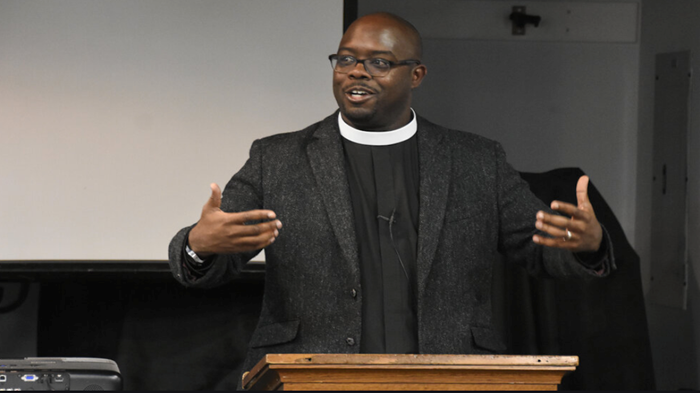Esau McCaulley: Interview

Esau McCaulley serves as assistant professor of New Testament at Wheaton College. This interview revolves around his much talked about book, Reading While Black.
Moore: What was the major impetus to write this book?
McCaulley : I simply wanted to write a book that took seriously the historic witness of Bible reading in the African American Christian tradition. I want to make a case that this tradition had something relevant to say to the present moment. As I was finishing my doctoral program in 2016, there was so much unrest and injustice. I wanted to contend that the Scriptures of the Old and New Testament could address the hopes and needs of African Americans.
I also got really tired of reading biblical studies books that seemed so detatched from the lived experiences of Black Christians. I wanted to write something that took the Bible seriously as God’s word on the one hand and the particular concerns of the Black community on the other. I wanted to show that we don’t have to throw the Bible away to talk about systemic injustice.
Moore: Many Christians I know (and Americans) use politics, politicized, and political in wholly negative ways. These are shorthand for nasty, corrupt, power plays, with worldly machinations that Christians are wise to steer clear of. You do a terrific job of showing that reading the Bible responsibly results in all kinds of implications, including things that relate to the so-called political sphere. Why do most Bible readers miss that connection?
McCaulley: I think that there is a vast difference between affirming the authority of the Scriptures and taking all the Scriptures seriously when considering the Christian witness to the watching world. In other words, what the Scriptures say about injustice, the poor, and the foreigner is just as inspired as what it says about personal holiness. Too often we have trained to believe that faithfulness to the gospel means focusing on a narrow set of issues, but when we take the blinders off we can see that the Scriptures and the Christian tradition addresses a variety of topics. We do not attempt to establish the kingdom in this or any country, but we can be clear about the ways in which our contexts fails to embody God’s future. What I have in mind is the recovery of the prophetic role of the church.
Moore: Christians in the West know how to cry but are unclear or uneasy about lament. I recently taught a group of college students through the life-giving book of Lamentations. Almost all these university students are from evangelical backgrounds, yet they all told me they never heard Lamentations preached in their churches. Why the dearth of attention to lament when it permeates the Bible?
McCaulley: I think that depends on your location. The Black context knows lament very well. Many of our artists historically have ranged from blues, to gospel, and R & B within the same career. Many of our gospel songs are laments. I think that we have more comfort with Laments because we own the brokenness of this country in a way that others do not. In other words, we do not have an idealistic picture of life as merely one of abundance. Unfornuately, we are well aware of the suffering that takes place here. Sometimes a picture of American exceptionalism bleeds into the life of the church and people focus more on the triumph rather than the triumph in the midst of suffering and loss.
Moore: It is one thing to lament. It is wholly different to lament with hope. What does that look like, especially when there is so much injustice? In other words, how can we keep hope tethered to realism and not fall prey to cynicism?
McCaulley: Christian hope is not merely a wish for a better future that may or may not actually improve. Christian hope is rooted in the resurrection. I have hope because I believe that Christ is risen. Stated differently, when I am tempted to fall into cynicism, I asked the most important of questions: Is the tomb empty? One more thing, possibly the most important thing. Sometimes, when I am nearing despair, I find myself interrupted by joy. I think that comes from the Holy Spirit. In the end, I have confidence that God will take care of his people. Nonetheless, I also know that Paul says that we can only reign with Christ if we suffer with him. Therefore, I know that in this world there will always be those who oppose God’s purposes, but I trust that the one who overcame death will in the end be victorious.
Moore: Your book does a great job of demonstrating the constant temptation to privilege certain truths of the Bible and avoid or diminish other truths. Tell us how you yourself guard against being selective in understanding and applying Scripture?
McCaulley: I try to be aware of the ways in which my context both helps and hinders my readings of the Scripture. It is good news, then, that the church spans time and space. I try to listen to voices from the past and contemporary voices who can see things that I cannot. I am convinced that we need the whole church, reading the whole bible, to discern the mind of Christ together.
Moore: It is clear throughout your book that you are committed to the close and careful reading of Scripture. Your conviction that Christianity is true is also clear and compelling. Was there ever a time where you felt the pull to abandon the Christian faith for some other religion or philosophy?
McCaulley: Yes, I spoke about it briefly in chapter four. There was a time when I wondered whether those who claimed that Christianity was a ‘white man’s’ religion were correct. It was a time much like the one we are in now in which African Americans felt harassed on all sides with very little help coming from their fellow believers. It was the beauty and truth of Christianity, the person of Christ, the carried me through that season.
Moore: What are two or three things you hope readers will get from your book?
McCaulley: I pray that people are inspired to continue to turn to the Bible as a source of hope. I hope that people begin to appreciate the legacy of African American Biblical interpretation and our wider Christian witness as a gift to the church and the world.
David George Moore is the author of the forthcoming Stuck in the Present: How History Frees and Forms Christians (Leafwood/Abilene Christian University Press). Some of Dave’s teaching videos and contact information can be found at www.mooreengaging.com.
Jesus Creed is a part of CT's
Blog Forum. Support the work of CT.
Subscribe and get one year free.
The views of the blogger do not necessarily reflect those of Christianity Today.



















